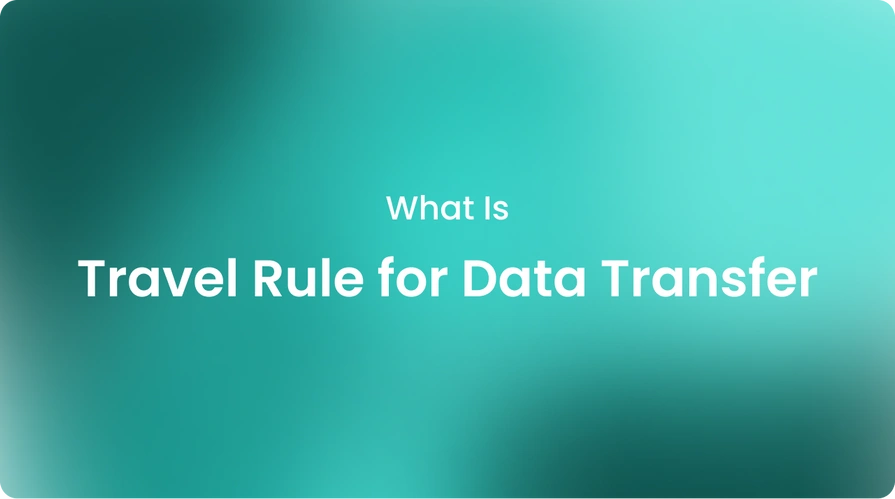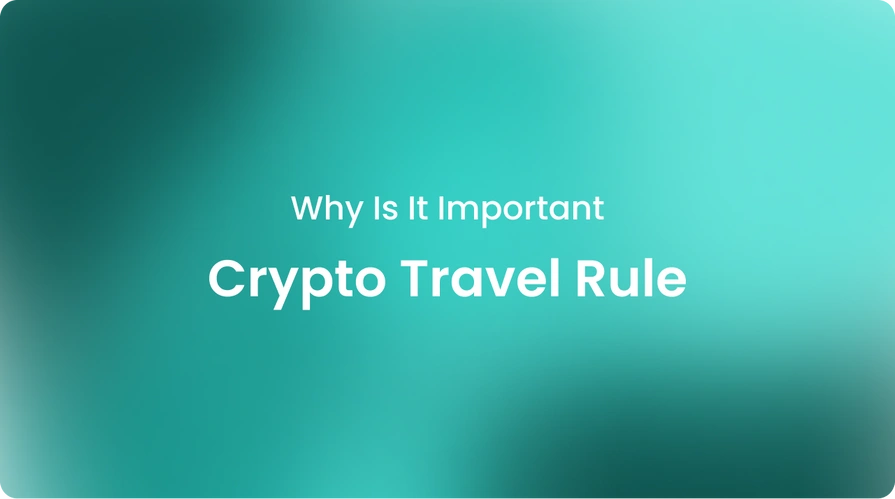|crypto, knowledgehub
What Is a Travel Rule for Data Transfer?

The Financial Action Task Force (FATF) introduced what is known as the "Crypto Travel Rule" to regulate data transfers involving cryptocurrencies and digital assets. But what exactly is the travel rule for data transfers? Let's explore this comprehensive guide, where you can find answers to all your questions!
At its core, the Crypto Travel Rule aims to increase transparency in financial transactions by mandating the exchange of key details between virtual asset service providers during transfers exceeding certain value thresholds.
However, implementing this rule has been a complex journey for the industry. Join us in this blog as we explore the FATF crypto travel rule, its purpose, how it is implemented, pros and cons, and more, especially for data protection.
What is the FATF's crypto travel rule?
When it comes to international travel rule standards, no group carries more weight than the Financial Action Task Force (FATF). The FATF, an intergovernmental body focused on fighting money laundering, collaborates with over 200 countries to establish policies through its 40 recommendations.
Recommendation 16, also known as the "Crypto Travel Rule," requires covered institutions to exchange details of transaction originators and beneficiaries. In 2019, the FATF updated this to explicitly include crypto exchanges and crypto custodians under the term "Virtual Asset Service Providers," or VASPs.
According to the FATF Crypto Travel Rule, VASPs must collect and share identifying information like names, addresses, national ID numbers, and transaction amounts for crypto transfers above $1000 USD (or equivalent). This applies whether the transaction involves fiat currency or cryptocurrency assets.
What is the purpose of the travel rule?
The overarching purpose of the travel rule is to foster transparency and prevent illicit activity within financial systems—both traditional and emerging virtual asset spaces.
By capturing who is sending what to whom through regulated businesses, authorities gain visibility into transaction flows that might warrant further investigation.
At the same time, privacy remains an important consideration. The original wire transfer travel rule called for more limited data collection below certain de minimis thresholds.
Similarly, the FATF Crypto Travel Rule only requires full Know Your Customer verification for higher-risk transactions exceeding $1000. Compliance measures should also balance the dual priorities of oversight and individual rights. It also encourages the adoption of AML standards to enhance security.
Issues with the Travel Rule
While the intent behind the crypto travel rule is valid, complying with it poses many challenges:
- Lack of unified implementation. Different countries have set varying transaction amount thresholds and implementation timelines, making it difficult for global VASPs.
- Interoperability issues. Since crypto transaction details need to traverse various platforms, ensuring protocol and data format compatibility is a hurdle.
- High compliance costs. Retrofitting systems for data collection and storage in accordance with regulations entails expensive retrofitting of many VASPs' technologies.
- Privacy concerns. Transacting parties face privacy risks when they share their personal information, particularly when they mishandle or expose their data in a breach.
- Technical obstacles. Off-chain transaction solutions are necessary because such transaction monitoring needs were not considered during the design of technologies like blockchain.
- Slow industry adoption. As per a Notabene report, only a third of respondents fully complied with the rule in 2022, indicating it will take time for widespread adoption.
The travel rule covers who?
As we described earlier, the crypto travel rule currently applies to virtual asset service providers, as defined by the FATF. This includes cryptocurrency exchanges, custodians, and certain wallet service providers. Any VASP handling transfers that exceed the threshold must comply.
However, the criteria for who is a "VASP" is still evolving. For example, recent guidance suggests self-hosted or non-hosted types of crypto wallets could, in some cases, fall under travel rule obligations if transacting commercially.
Determining coverage is sometimes complex, and interpretations may vary in different countries. However, the main purpose of the crypto travel rule remains the same.
How is the travel rule implemented?
Implementing the crypto travel rule can take several forms. VASPs integrate compliance software solutions that can identify counterparties, screen them for sanctions lists, encrypt, and transmit required details.
Some jurisdictions also provide special licensing for travel-related activities. Communication between entities commonly happens through messaging protocols like SRTP.
Phased compliance begins with establishing controls and ensuring that crypto transactions between verified counterparties adhere to the requirements. Full implementation may take years as regulations and solutions progress. In this regard, a coordinated approach will help.
What information is needed for travel rule compliance?
When transfers exceed the threshold, the data transferred between counterparties must include certain minimum elements. This includes minimal details such as customer names, addresses, transaction amounts, addresses, and account numbers.
However, specific requirements for travel rule compliance can vary in different jurisdictions. For example, in Singapore, five elements are mandatory: originator and beneficiary names and addresses, transaction amount, and dates.
Regulations provide flexibility, but the baseline elements ensure necessary transparency while respecting privacy and data protection laws.
What are the pros and cons of the travel rule?
Though challenging to adopt, the FATF crypto travel rule aims to balance fostering innovation with combating illegal activity through increased transparency. On the plus side, it bolsters crypto's legitimacy as investors and traditional financial institutions demand strong anti-money laundering practices.
It also aids global cooperation. However, over-compliance could stifle growth for an industry aiming to better serve the unbanked. Technical issues also remain. With cooperation and balanced implementation, the travel rule's pros can hopefully outweigh the cons over the long term.
What is the travel rule in blockchain?
Blockchain provides an innovative way to directly implement elements of the travel rule. For example, cryptocurrencies and stablecoins offer transparent transactions that are fast and secure.
The rule has the potential to encode the required information directly into blockchain transactions for self-executing compliance. This removes reliance on centralized intermediaries and offers a universally accessible record of transfers while maintaining privacy through encryption.
Blockchain technology holds promise for travel rule compliance, but more work remains. Also, for maximum security, you need to work with an expert crypto service provider, such as Cryptobunq.
Cryptobunq is a one-stop-shop crypto service provider that offers efficiency, security, and expertise for your crypto and blockchain projects. With CBQ, you can benefit from solutions such as crypto checkout and invoicing, batch crypto payments, crypto exchange API, custody and wallet, and more.
If you would like to explore the possibilities and advantages that Cryptobunq offers for your business, make sure to check out our case studies. You can also follow CBQ blogs to learn about updates, news, and common crypto knowledge that can be beneficial for your business’ future!
How does blockchain transfer data?
Blockchain facilitates data transfer through cryptographic techniques like encryption and digital signatures. A blockchain records certain details, such as amounts, addresses, and timestamps, in an immutable, traceable manner on the distributed ledger when a transaction takes place.
Inter-VASP transfers can incorporate needed identifiers without publicly revealing personal details through encryption. Platforms like Cryptobunq, which offer many blockchain solutions, could potentially leverage blockchain to transmit required data while maintaining customer privacy.
Standards continue to evolve, but the decentralization and programmability of blockchain offer an innovative compliance approach compatible with privacy.
What is the travel rule for transfers?
As previously stated, the FATF travel rule's core requirement is the exchange of details for virtual asset transfers over set value thresholds. For transfers between verified counterparties where neither party is anonymous, things like customer names and addresses must be shared.
When transferring to unverified parties, more is expected to help identify recipients. Compliance helps protect the crypto ecosystem from abuse while financial inclusion advances.
What is the travel rule in data protection?
An important consideration in travel rule implementation is compliance with stringent data protection laws around the world. These laws govern the collection and use of personal information.
The developed solutions for travel rules in data protection must guarantee the confidentiality of identifiers and prevent their misuse or exposure in data breaches.
Technologies like homomorphic encryption that allow computation on encrypted data without decrypting it first are helpful. Platforms with a strong security track record, like Cryptobunq, which offers various services, are best suited.
Regulators also provide guidance to harmonize rule adherence while respecting an individual’s right to privacy. When implemented securely, the travel rule need not contradict robust data protection.
The bottom line
While imposing new demands, the FATF crypto travel rule emerged from the important objective of protecting integrated financial systems from criminal misuse. Various jurisdictions are implementing it with a phased approach.
Though it is challenging to align technical and regulatory factors, partnerships between compliance solution providers, VASPs, and regulators seem critical to making progress.
The goals of preventing illicit activity with the travel rule for data transfer while enabling financial inclusion through innovations like stablecoins and blockchain can hopefully both be advanced in time.
Furthermore, with cooperation on standards and solutions, this complex journey seems navigable. In this regard, Cryptobunq is here for you as an expert crypto service provider. Contact us today and discover our secure services for fundamentally growing your business with the power of blockchain!













